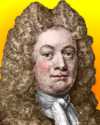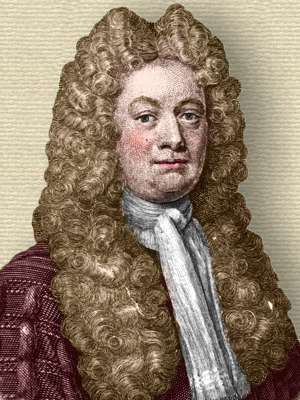 (source)
(source)
|
Thomas Fuller
(24 Jun 1654 - 17 Sep 1734)
English physician whose practice was in Sevenoaks, Kent. His Pharmacopoiea of a thousand prescriptions for medicines appeared in at least 12 editions. He also published Gnomologia in which he collected 6496 adagies and proverbs.
|
Science Quotes by Thomas Fuller (21 quotes)
A tree is known better by its Fruit, than its Leaves.
— Thomas Fuller
No. 444 in Gnomologia: Adagies and Proverbs, Wise Sentences and Witty Sayings (1732), 17. Compare with No. 4280, “Such as the Tree, such is the Fruit”, p.183.
All things are difficult before they are easy.
— Thomas Fuller
No. 560 in Gnomologia: Adagies and Proverbs, Wise Sentences and Witty Sayings (1732), 21.
All things are easy, that are done willingly.
— Thomas Fuller
No. 561 in Gnomologia: Adagies and Proverbs, Wise Sentences and Witty Sayings (1732), 21.
All things help, quoth the Wren, when he piss’d in the Sea.
— Thomas Fuller
No. 563 in Gnomologia: Adagies and Proverbs, Wise Sentences and Witty Sayings (1732), 21. [Note: this earthy wisdom is misinformed; in general, birds do not have a urinary bladder and excrete kidney waste as uric acid along with faeces as a semisolid waste. —Webmaster]
He that plants trees, loves others besides himself.
— Thomas Fuller
No. 2248 in Gnomologia: Adagies and Proverbs, Wise Sentences and Witty Sayings (1732), 91.
He who cures a disease may be the skillfullest, but he who prevents it is the safest physician.
— Thomas Fuller
In Practical Spelling: A Text Book For Use in Commercial Schools (1902), 34.
He who plants a Walnut-Tree, expects not to eat of the fruit.
— Thomas Fuller
No. 2401 in Gnomologia: Adagies and Proverbs, Wise Sentences and Witty Sayings (1732), 99.
If thou hast knowledge, let others light their candle at thine.
— Thomas Fuller
In Introductio ad Prudentiam: or, Directions, Counsels, and Cautions, Tending to Prudent Management of Affairs in Common Life (1727), Part II, 2, Moral No. 1784. Often seen incorrectly attributed to Sarah Margaret Fuller or Winston Churchill, slightly reworded, for example, as “If you have knowledge, let others light their candles with it.”
Nature is beyond all teaching.
— Thomas Fuller
No. 3505 in Gnomologia: Adagies and Proverbs, Wise Sentences and Witty Sayings (1732), 91.
Nature takes as much Pains in the Womb for the forming of a Beggar as an Emperor.
— Thomas Fuller
No. 3507 in Gnomologia: Adagies and Proverbs, Wise Sentences and Witty Sayings (1732), 91.
Nothing is easy to the unwilling.
— Thomas Fuller
No. 3663 in Gnomologia: Adagies and Proverbs, Wise Sentences and Witty Sayings (1732), 156.
Of the Passive Principle, and Material Cause of the Small Pox ... Nature, in the first compounding and forming of us, hath laid into the Substance and Constitution of each something equivalent to Ovula, of various distinct Kinds, productive of all the contagious, venomous Fevers, we can possibly have as long as we live.
— Thomas Fuller
Exanthematologia: Or, An Attempt to Give a Rational Account of Eruptive Fevers, Especially of the Measles and SmallPox (1730), Part II, 'Of the Small-Pox', 175. In Ludvig Hektoen, 'Thomas Fuller 1654-1734: Country Physician and Pioneer Exponent of Specificness in Infection and Immunity', read to the Society (8 Nov 1921), published in Bulletin of the Society of Medical History of Chicago (Mar 1922), 2, 329, or in reprint form, p. 11.
Plant the Crab-Tree where you will, it will never bear Pippins.
— Thomas Fuller
No. 3880 in Gnomologia: Adagies and Proverbs, Wise Sentences and Witty Sayings (1732), 165.
Such as the Tree, such is the Fruit.
— Thomas Fuller
No. 4280 in Gnomologia: Adagies and Proverbs, Wise Sentences and Witty Sayings (1732), 183. Compare with No. 2248, “A tree is known better by its Fruit, than its Leaves”, on p.91.
The anatomy of a little child, representing all parts thereof, is accounted a greater rarity than the skeleton of a man in full stature.
— Thomas Fuller
In The Church History of Britain (1842), Vol. 1, 165. Fuller’s context was to compare being studious in antiquity with after-ages when perfected.
The frost is God’s plough which he drives through every inch of ground in the world, opening each clod, and pulverizing the whole.
— Thomas Fuller
As quoted in Henry Southgate (ed.), Many Thoughts of Many Minds (1862), 237.
The Pestilence can never breed the Small-Pox, nor the Small-Pox the Measles, nor they the Crystals or Chicken-Pox, any more than an Hen can breed a Duck, a Wolf a Sheep, or a Thistle Figs; and consequently, one Sort cannot be a Preservative against any other Sort.
— Thomas Fuller
In Ludvig Hektoen, 'Thomas Fuller 1654-1734: country physician and pioneer exponent of specificness in infection and immunity', Bulletin of the Society of Medical History of Chicago (Mar 1922), 2, 321. In the reprint of the paper alone, the quote is on page 3.
There are more old Drunkards than old Physicians.
— Thomas Fuller
No. 4858 in Gnomologia: Adagies and Proverbs, Wise Sentences and Witty Sayings (1732), 210. Later printed by Benjamin Franklin as, “There’s more old Drunkards than old Doctors,” in Poor Richard’s Almanack (1736). The quote appears centuries earlier by François Rabelais (1596), as translated to English: “A hundred devils leap into my body, if there be not more old drunkards than old physicians.” See the François Rabelais quotes page on this website.
We never know the Worth of Water till the Well is Dry.
— Thomas Fuller
Proverb collected by Fuller, No. 5451 in Gnomologia: Adagies and Proverbs: Wise Sentences and Witty Sayings, Ancient and Modern, Foreign and British (1732), 237. Compare with Benjamin Franklin, published later, “When the well’s dry, we know the worth of water”, in Poor Richard’s Almanac (1757, 1900), 23.
We perfectly know what is Good, and what is Evil; and may be as certain in Morals as in Mathematics.
— Thomas Fuller
No. 5452 in Gnomologia: Adagies and Proverbs, Wise Sentences and Witty Sayings (1732), 238.
What the Eye sees, need not to be guessed at.
— Thomas Fuller
No. 5518 in Gnomologia: Adagies and Proverbs, Wise Sentences and Witty Sayings (1732), 241.
See also:
- 24 Jun - short biography, births, deaths and events on date of Fuller's birth.
- Thomas Fuller - context of quote “He that plants trees” - Medium image (500 x 250 px)
- Thomas Fuller - context of quote “He that plants trees” - Large image (800 x 400 px)



 In science it often happens that scientists say, 'You know that's a really good argument; my position is mistaken,' and then they would actually change their minds and you never hear that old view from them again. They really do it. It doesn't happen as often as it should, because scientists are human and change is sometimes painful. But it happens every day. I cannot recall the last time something like that happened in politics or religion.
(1987) --
In science it often happens that scientists say, 'You know that's a really good argument; my position is mistaken,' and then they would actually change their minds and you never hear that old view from them again. They really do it. It doesn't happen as often as it should, because scientists are human and change is sometimes painful. But it happens every day. I cannot recall the last time something like that happened in politics or religion.
(1987) -- 


